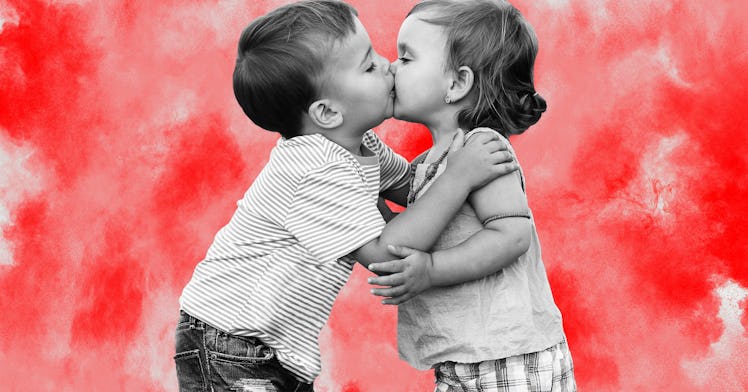Stop Turning Toddlers’ Acts Of Affection Into Puppy Love
It's not healthy for parents to romanticize childhood friendships and affection as puppy love, no matter how funny the pretend wedding might be.

When toddlers hang out with one another, it’s not puppy love or a date. Young children do not have boyfriends or girlfriends. They just have friends. But try telling that to those moms and dads who positively croon when a little boy and a little girl innocently ask for a playdate. It’s clearly inappropriate, and clearly annoying, when parents romanticize early childhood relationships. But is it developmentally harmful? Or is there nothing wrong with a little light teasing?
“While parents’ intentions are typically innocuous, I’d discourage parents from using this terminology,” Dana Dorfman, and psychotherapist and co-host of the podcast 2 Moms on the Couch, told Fatherly. “Such statements are often conveyed in with a joking, humorous tone- which children are unable to understand. They may interpret this as something to be ashamed of.”
Until around age five, it probably doesn’t matter. Although children begin developing language skills around age two, they’re likely to miss terms like “boyfriend” or “girlfriend”, and their grasp of tone, mocking, and joking is essentially non-existent. It might be a rotten habit to get into—and it might be obnoxious to other parents, who would rather you not sexualize normal childhood interactions—but you’re unlikely to do any harm when you make fun of your two-year-old’s puppy love.
The dialogue becomes problematic at around age of five, because that’s when children begin remembering interactions with their parents and internalizing details of conversations. When you tell a five year old that his female friend is his girlfriend, he hears you—for better or worse. “Such messages convey that these are the expected norms of partnership,” Dorfman says. “Such titles also impose heteronormative messages which make assumptions about children’s identities.”
Parents who project romantic feelings onto school-aged children’s friendships can cause problems for future heterosexual relationships as well, psychologist Roseanne Lesack warns. Particularly, when boys tease, roughhouse, and pick on girls and parents respond by saying “he has a crush,” this normalizes abusive behaviors, and sends the message that boys hurt the girls that they like.
“For boys it reinforces the idea that if I like a girl I should be mean to her. And it tells girls that it’s OK for boys to be mean because they like you,” Lesack told Fatherly.
Lesack and Dorfman agree that these are real risks parents should be aware of before throwing boyfriend and girlfriend around, but also note that parents should not beat themselves up over the occasional wisecrack. More often than not kids know their parents are just messing with them—or miss the comment entirely—and the biggest risk parents run is embarrassing their kids.
Still, that’s not a risk parents want to take lightly. If moms and dads embarrass their kids too much, they may not come to them when they actually need to talk about their feelings and emotions for another person. And that’s not really worth the laugh. “The most important thing is to have an open line of communication, to not put your expectations on your children, and to really be thoughtful about how you’re approaching your children so they can feel comfortable talking to you,” Lesack says.
“If you’re teasing your kid about liking someone, when they actually feel that way they’re not going to talk to you.”